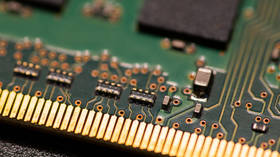US tech giant expects chip challenges to persist for two more years

US chip-making giant Intel has warned that the ongoing chip shortage will linger until 2024 and possibly beyond.
“The chip shortage cost the US economy $240 billion last year, and we expect the industry will continue to see challenges until at least 2024 in areas of foundry capacity and tool availability,” Intel CEO Pat Gelsinger said in a Thursday earnings call.
Gelsinger also said Intel had been working to “mitigate” any disruptions from the current lockdowns in Shanghai, along with the Russia-Ukraine military conflict, adding that manufacturing conditions may worsen if the Covid-19 lockdowns in China persist.
The company also reported that demand for PCs has been falling over the past several months. In the first quarter of the current year, Intel’s revenue for PCs dropped 13% year-over-year to $9.3 billion due to inflationary pressures, component concerns, and sagging sales.
Overall, Intel reported net income of $8.1 billion, which grew by a staggering 141% versus a year ago. Revenue dipped by 7 percent to $18.4 billion, however.
The chip shortage severely hit global producers during the Covid-19 pandemic in 2020-21 after remote work and mobility restrictions triggered an acceleration of digitization across the world. The crisis was seriously aggravated by the current conflict in Eastern Europe, as Ukraine and Russia provide the bulk of the world’s supplies of neon and palladium, vital for the production of microchips.
For more stories on economy & finance visit RT's business section













